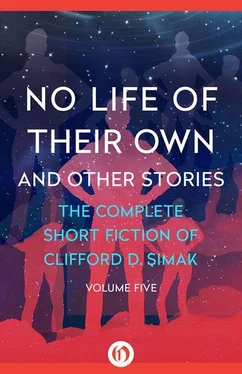But that wasn’t all.
The streak of gray on the left side of my head was gone! The hair was coal-black!
Alarmed, I rumpled my hair, searching for gray ones. There weren’t any.
It wasn’t until then I remembered the capsules.
A frantic search of the vest pocket where I had placed the ones filled with old Eli’s salts failed to locate them.
There was just one explanation. Absent-mindedly I had fished them out of the pocket, put them with the others on the bedside table.
Could it be that I had taken one of them when I had awakened? And if I had, would that account for the filled out cheeks, the disappearance of the gray streak?
I sat down, flabbergasted.
I remembered old Eli had told me he sold those salts to Dr. Vincent out at the Sunward sanitarium.
Back at my shaving once again, I knew there was just one thing to do. I had to see Dr. Vincent right away.
And when I went to see him I would carry a short steel bar. One that would fit my coat pocket. There would be a use for it.
Seeing Dr. Vincent was easier said than done. Few people saw him. Both he and his predecessor, Dr. Brown, were noted for their reluctance to appear in public. Too engrossed in their work, they had always said.
Anderson, Brown and Vincent, three strange men. Anderson under the stele that rose before the sanitarium entrance. Brown, undoubtedly dead, but with his later life, after he had left the sanitarium, shrouded in mystery. Vincent, present head of the institution, practically unknown to the medical profession except by reputation.
Three men who had dedicated their lives to finding a cure for the space sickness. Men who, so far, had failed. To them, from all the far corners of the Solar System came the space dopes, the men stricken by the dread disease which even now spelled the swift doom of all on whom it fastened. Not so swiftly now, perhaps, but nevertheless certain.
For the sanitarium had made some progress. By its treatment with radiations it could ease the pain, could slow up the ravages, give each victim a few more months to live, an easier death. But that was all. The space sickness still was fatal. There was no cure.
I had visited the sanitarium only once before—when I first had come to New Chicago. The New York office had wanted a feature story about the place and I had gotten it, but not from Dr. Vincent. I had not, in fact, seen Dr. Vincent. The soft-voiced robot secretary had told me he was very busy. An equally soft-voiced robot attendant had taken me in tow, had shown me the building, explained its workings, discussed learnedly the work of Dr. Vincent. It was a good story.
Practically all the attendants, I knew, were robots.
“We do not make mistakes,” the soft-voiced metal-man had told me. “Here, where mistakes are fatal, we are better than a human being.”
Which sounded like a good explanation, but left one sort of hanging in the air.
This time, as the time before, I had no trouble getting to the secretary who guarded Vincent’s office. And this time, as the time before, I got the same answer.
“Dr. Vincent is very busy. What is it you want?”
I leaned closer, across the desk, cutting off access to the row of call buttons.
“It’s a matter of life and death,” I said and even as I spoke I yanked the short steel bar out of my pocket and struck.
I put everything I had into that blow and I knew just where to hit, right between the robot’s gleaming eyes.
The one blow was enough. It dented in the heavy metal, smashed the delicate mechanism. The robot slid off the chair, clanged onto the floor.
For long seconds I stood there, hoping against that the walls were soundproofed. They must have been, for there was no scurry of feet outside, no sound from Vincent’s inner office.
Walking softly, thanking my stars the doors did not boast newfangled locks but the simple latches of the day when the sanitarium had been built, I locked the outer door, then strode across the room and twisted the knob to Vincent’s office. It turned in my hand and I stepped inside.
A man sat at a desk directly opposite the door. A man well past middle age, with snow-white hair. He was busy and did not look up when I came in. If he had heard me at all, he probably thought I was the secretary.
“Dr. Anderson?” I asked.
“Why, yes. What can I—”
And then he jerked his head up and stared at me.
I laughed at him softly.
“I thought so,” I said.
Muscles jerked around his jaws, as if he were trying to keep his teeth from chattering.
“Who are you?” he asked hoarsely.
“A friend of old Eli’s,” I told him.
“He sent you?”
“No, he didn’t send me. Eli is dead.”
He started out of his chair at that. “What’s that you say? Old Eli is dead? Are you certain?”
“The news,” I told him, “has been in the papers. The radio carried it.”
“I get no papers,” he said. “I have no time to read them. The radio over there,” he jerked his head toward an old set in the corner, “hasn’t been turned on for months.”
“It is the truth,” I said. “Murdered. And the salts were stolen.”
The man behind the desk went pale.
“The salts stolen!”
“Someone,” I said, “who guessed what they were.”
He sat down slowly, as if every ounce of strength had drained from his body. Huddled behind his desk he looked an old, old man.
“You’ve been afraid of this for years,” I said.
He nodded dumbly.
Silence hung between us, a long and empty silence and looking at the man, I felt sorry for him.
“Afraid of it,” he said, “for two reasons. But I guess it doesn’t matter any more. I’ve failed. There is no cure. There was just one hope left and that has failed—”
I paced swiftly across the room.
“Look,” I shot at him, “are you actually admitting that you are Dr. Anderson?”
He looked at me. “Why not?”
I stammered a little. “I thought you would put up a fight.”
“There’s no use of fighting any more,” he said. “Two hundred years is too long for any man to live. Especially when he fails year after year at the goal he had set himself.”
“Dr. Anderson,” I said, half speaking to myself, half to him. “Dr. Brown and now Dr. Vincent.”
He smiled faintly. “All three of them. It was easily arranged. I built the sanitarium, I owned it. I was accountable to no one. I named my successor and my successor named his successor. Why should the world wonder? The men who were named were men from the laboratory in this place. Obscure men, of course, but men familiar with the work.”
He smiled wanly at me. “Clever?”
“But the staff?” I asked.
“Except at first, there has been none. Just myself and the patients and the robots. The robots don’t talk, the patients die.”
He drummed his fingers on the desk. “And who are you?”
I took a long breath. “Sherm Marshall of the Solar Press.”
“And you want a story?”
I nodded, fearful of what would happen next.
And the thing that happened was the last thing I expected.
“Sit down,” he said. “Since you are here, you may as well know what has been going on.”
“That’s swell of you, Doctor,” I said, waiting for the lightning to strike.
No lightning struck.
“Have you ever kept a thing bottled up inside yourself so long you wanted to shriek?” he asked. “Have you ever ached to tell something that you knew and still you couldn’t tell it?”
I nodded.
“That’s me,” said Dr. Anderson.
He sat silent so long I thought he had forgotten me, but finally he went on.
“I came here with a theory that the radiations thrown out by the Sun, properly screened for selectivity, would have a curative effect upon the victims of space sickness. It worked, to an extent. It alleviated the malady, but it was not a cure. It didn’t go far enough. It gave a few added months, in some cases a few added years, of life, but that was all. I knew that I had failed.
Читать дальше












